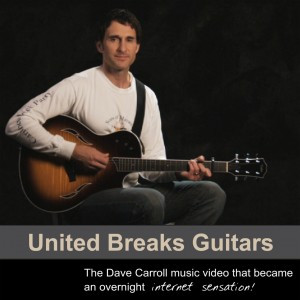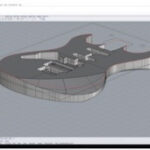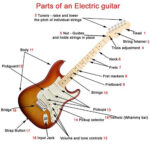 United Breaks Guitars
United Breaks Guitars
For musicians, their instruments are more than just tools; they are companions on a creative journey, extensions of their artistic voice. Imagine the horror, then, of witnessing your prized guitar being carelessly tossed around like luggage. This is precisely what happened to Dave Carroll of Sons of Maxwell, setting off a chain of events that would resonate with musicians worldwide and highlight the importance of United Guitar advocacy for instrument safety during travel.
It began on March 31, 2008, as Sons of Maxwell embarked on a week-long tour of Nebraska. Their journey started with a United Airlines flight from Halifax to Omaha, transiting through Chicago. Seated at the back of the aircraft during the first leg, a fellow passenger unknowingly alerted them to a musician’s worst nightmare. As the plane landed, she exclaimed, “My god they’re throwing guitars out there!” Bassist Mike peered out the window just in time to see his bass guitar being hurled by baggage handlers, with Dave Carroll’s cherished $3500 710 Taylor guitar having already suffered the same rough treatment.
Dave immediately attempted to inform a flight attendant about the mishandling of the instruments. However, his concerns were brushed aside with a curt, “Don’t talk to me. Talk to the lead agent outside.” The individual pointed out as the “lead agent” turned out to be an “acting” agent who deflected responsibility and disappeared into the airport crowd. A third employee at the gate dismissed his concerns about the expensive instruments being thrown, stating, “but hun, that’s why we make you sign the waiver.” Dave clarified that he hadn’t signed any waiver and that no waiver could justify such blatant disregard for fragile instruments. He was advised to address the issue with the ground crew in Omaha upon arrival.
“My god they’re throwing guitars out there.”
The band arrived in Omaha late that night, around 12:30 am, after a delayed flight. No United Airlines staff were readily available. Dave was later informed that he should have inspected his guitar at the airport, even removing it from its protective case. However, fatigued from travel and seeing no immediate external damage to the case, they proceeded to their hotel, unaware of the extent of the damage. The next day, during a sound check, the devastating truth was revealed: the base of Dave’s Taylor guitar was smashed.
A week later, upon returning to Omaha for their flight back, Dave reported the incident. The United agent in Omaha directed him to initiate a claim at the origin airport – Halifax. This marked the beginning of a frustrating and protracted battle with airline bureaucracy.
I immediately tried to communicate this to the flight attendant who cut me off saying: “Don’t talk to me. Talk to the lead agent outside.”
Back in Halifax, Dave discovered that United Airlines had a limited operational presence, partnering with Air Canada. Despite flying on United-branded planes, claim processing was directed through Air Canada. Air Canada provided a phone number to file a claim with United. Upon contacting United, Dave was instructed to return to Halifax airport with the damaged guitar to have it inspected and initiate a claim. At Halifax airport, an Air Canada employee, acting on behalf of United, acknowledged the damage and created a claim number. However, the claim was promptly “denied” by Air Canada, citing that they were not liable for damages caused by United employees in Chicago—a point that Dave conceded was logical.
Undeterred, Dave contacted United again, armed with the claim number. Subsequent calls often involved lengthy searches for the claim, which would eventually surface. He spoke with several customer service agents, many of whom he believed were based in India. Ironically, these agents were consistently the most empathetic and apologetic. After months of back and forth, Dave was eventually directed to United’s baggage office in Chicago. Following numerous attempts to connect, he was instructed to bring the guitar to Chicago for inspection—a considerable journey from Halifax, Canada.
Explaining the impracticality of transporting the damaged guitar from Halifax to Chicago, Dave was then redirected to Central Baggage in New York, provided with a toll-free number. He contacted the New York office and spoke to a representative who, despite questioning why Chicago had referred him, displayed empathy and requested that Dave fax all relevant documentation. He complied, but weeks passed without response. Upon calling back, the representative claimed to have not received the fax initially, only to locate it upon further searching. She requested a couple of days and promised to follow up. However, when Dave called back after two days, the number had been disconnected.
Three or four months later I got directed to the Chicago baggage offices of United and after several attempts to speak with someone was told to simply bring in the guitar for inspection… to Chicago… from Halifax, Canada.
Dave was forced to restart the claim process, again calling the 1-800 number, likely routing back to India. The agents were again apologetic, struggled to locate the claim initially, and ultimately reiterated the need to bring the guitar to Chicago O’Hare for inspection. Six months had elapsed. In the interim, Dave had his guitar repaired at a cost of $1200, restoring its playability but losing much of its original character. He managed to speak to a customer service manager in India who pledged to escalate the issue in Chicago. A month later, an unsigned letter arrived from Chicago, vaguely stating that someone would contact him.
Another month passed before an email arrived from a Ms. Irlweg in Chicago. The email expressed regret but formally denied the claim. The reasons cited included:
- Failure to report the damage to United employees in Omaha (who were absent upon arrival).
- Not reporting the damage within 24 hours in Omaha (while the band was touring outside Omaha).
- Attributing the issue to Air Canada.
- Referencing Air Canada’s denial (despite it being for damages caused by United).
- Demanding inspection of the already repaired guitar in Chicago.
After nine months of emails with Ms. Irlweg, and despite requests to speak to a supervisor, United’s final stance was unwavering: they denied responsibility and declared the matter closed. Dave’s final settlement offer of $1200 in flight vouchers—to cover the repair costs—was rejected.
It was at this juncture that Dave realized the futility of further direct confrontation. The system seemed designed to exhaust claimants into abandoning their cases. However, as a songwriter and touring musician, Dave understood he possessed alternative avenues. In his final email to Ms. Irlweg, he informed her of his intention to write three songs about his United Airlines experience. He planned to create videos for these songs and offer them as free downloads on YouTube and his website, inviting viewers to vote for their favorite “united guitar” inspired track – although “united guitar” in this context was more about musicians banding together in shared experiences. His ambitious goal: to reach one million views within a year.
This marked a turning point, transforming a personal grievance into a powerful example of how creative expression and a united guitar community can amplify a message far beyond individual complaints. The story of “United Breaks Guitars” became a viral sensation, demonstrating the impact of a united voice and the enduring power of music in the face of corporate indifference, and highlighting the need for better protection for musicians and their instruments when flying.
To delve deeper into the global impact of this story and the significant achievements of “United Breaks Guitars,” you can read more about Dave Carroll about Dave Carroll.


